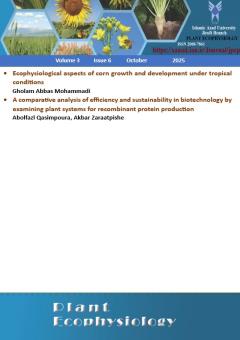A comparative analysis of efficiency and sustainability in biotechnology by examining plant systems for recombinant protein production
Subject Areas : Journal of plant ecophysiologyAkbar Zaraatpishe 1 , Abolfazl Qasimpour 2
1 -
2 -
Keywords: comparative, analysis, biotechnology, protein production,
Abstract :
Objective: The purpose of this study is to explore the potential of using plants as a novel and efficient system for the production of recombinant proteins, which are crucial for various biotechnological applications, including therapeutics and vaccines.
Methods: This research employs a comparative analysis of traditional recombinant protein production methods against plant-based systems. The study involves the genetic engineering of specific plant species to express target proteins, followed by the evaluation of protein yield, functionality, and purification processes. Various factors such as growth conditions, plant species selection, and post-harvest processing are systematically analyzed to optimize production efficiency.
Results: The findings show that plant-based systems can produce recombinant proteins with comparable efficiency and performance. The aim of this study is to investigate the potential of using plants as a novel and efficient system for the production of recombinant proteins, which are very important for various biotechnological applications, including therapeutics and vaccines. compared to conventional methods. Key advantages include lower production costs, reduced risk of contamination, and the ability to perform post-translational modifications. Additionally, the study identifies specific plant species that demonstrate superior expression levels for certain proteins.
Conclusions:This research contributes to the field of biotechnology by presenting a viable alternative to traditional recombinant protein production methods. It highlights the advantages of using plants, not only in terms of efficiency and cost-effectiveness but also in scalability and environmental sustainability. The study paves the way for further exploration of plant-based systems in the production of complex biopharmaceuticals
Cohen, J., et al. (2017). "Challenges in the purification of recombinant proteins from plants." Biotechnology Advances, 35(2), 182-194.
Ghosh, S., et al. (2018). "Plant-based systems for recombinant protein production: A review." Critical Reviews in Biotechnology, 38(5), 691-703.
Gleba, Y., et al. (2014). "Viral vectors for plant transformation." Current Opinion in Biotechnology, 26, 1-8. Huang, J., et al. (2017). "Comparative analysis of recombinant protein production in rice and maize." Transgenic Research, 26(2), 215-227.
Rosenberg, J., et al. (2019). "Sustainability of plant-based recombinant protein production." Environmental Science & Technology, 53(12), 7125-7135.
Sainsbury, F., & Lomonossoff, G. P. (2014). "Translational enhancement in plants." Plant Biotechnology Journal, 12(8), 1011-1020.
Sharma, A., et al. (2020). "Emerging technologies in plant biotechnology for recombinant protein production." Biotechnology Journal, 15(1), 1900342.
Walsh, G. (2010). "Biopharmaceutical benchmarks 2010." Nature Biotechnology, 28(9), 935-940.


